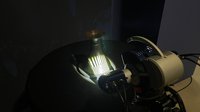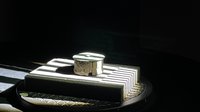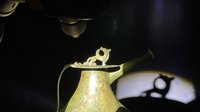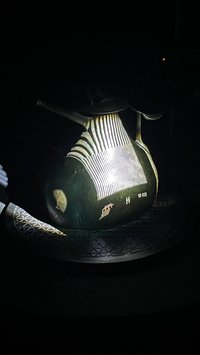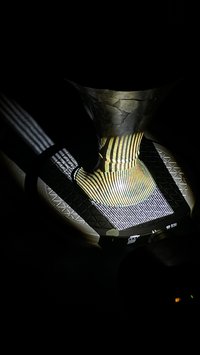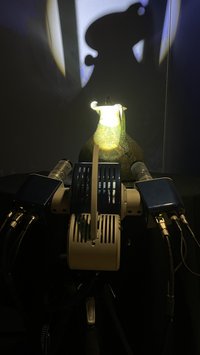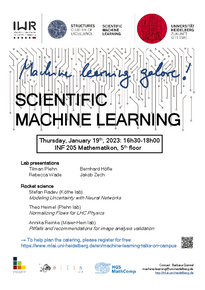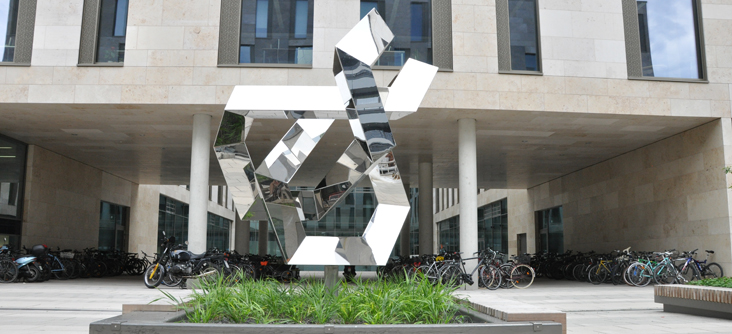
Newsroom
The IWR is an interdisciplinary research center for Scientific Computing which builds bridges across disciplines. It promotes mathematical and computational methods in science, engineering and the humanitites. Currently the IWR comprises more than 50 research teams from various faculties. Around 600 scientists work together in interdisciplinary cooperation projects. In addition to educating the next generation of excellent scientists the IWR also focuses on advacing international research networks.
2023
December 21, 2023
Prof. Guy Wolf to Join STRUCTURES and IWR
as Humboldt Research Fellow in 2024
We are delighted to announce that Prof. Guy Wolf, CIFAR AI Chair at MILA, Montreal, and Associate Professor at Université de Montréal, will be joining Heidelberg University for a research stay at the Interdisciplinary Center for Scientific Computing (IWR) and STRUCTURES in early 2024, as part of the competitive Humboldt Research Fellowship Programme.
The Humboldt Research Fellowship enables outstanding researchers to conduct their own research in collaboration with a host at a German research institution of their choice, fostering a dynamic exchange of knowledge and expertise. During his stay in Heidelberg, Prof. Wolf will also hold a one-week compact course for MSc and PhD students.
Prof. Wolf's research focuses at the intersection of machine learning, data science and applied mathematics. He is particularly interested in data mining methods utilizing manifold learning and deep geometric learning, as well as applications for exploratory analysis of biomedical data. His multidisciplinary approach integrates machine learning, signal processing, and applied mathematics to discover patterns, dynamics, and structures in large high-dimensional datasets.
Further information and links:
November 24, 2023
Scientific Software Center - Project Funding:
Innovative Software for Modern Research
DFG makes finance available for three projects on quality assurance of research software
The continuing development and long-term quality assurance of research software is the priority of three projects at Heidelberg University that were successful in a call by the German Research Foundation (DFG). One project is based in biomedicine, two others in geography. Participating are scientists in the respective disciplines as well as experts from the Scientific Software Center, which is based in the Interdisciplinary Center for Scientific Computing at Ruperto Carola. The DFG is making funding totalling approximately 1.2 million euros available for three years. The project teams involved will be able to improve the quality of available software and make it available to a wider group of users.
A challenge facing modern, digital research is that science increasingly depends on the use and development of customised research software, for which the necessary resources and structures are, however, often limited or lacking, explains Prof. Dr Jürgen Hesser, director of the Interdisciplinary Center for Scientific Computing (IWR) and scientific coordinator of the Scientific Software Center (SSC). “Our success in the DFG call proves that Heidelberg University is excellently positioned when it comes to research software. As part of the funding as a University of Excellence, the SSC was established with the goal of advising and supporting researchers in all matters of software development,” says Prof. Hesser.
The goal of the biomedical project is to make software for storing and processing molecular findings available to a broader group of users. To achieve this, the existing codebase will be restructured and software access improved. By means of a system of incentives, the participating scientists want to recruit a community of developers who process problems arising and undertake maintenance jobs. The project “Establishing a knowledge graph community in biomedical science” is jointly handled by Dr Inga Ulusoy from the Scientific Software Center and Dr Sebastian Lobentanzer. Dr Lobentanzer is a postdoctoral researcher in the “Systems Biomedicine” research group headed by Prof. Dr Julio Saez-Rodriguez at Heidelberg University Hospital.
Adding various aspects to broaden the usefulness and reproducibility of research software for laser scanning data simulation is the focus of the project “Fostering a community-driven and sustainable HELIOS++ scientific software”. Dr Dominic Kempf from the SSC is cooperating with the 3DGeo research group of Prof. Dr Bernhard Höfle, located at Heidelberg University’s Institute of Geography. A software package was developed there to simulate measurements by means of laser scanning. The studies aim, in the coming three years, to guarantee a long-term, continuing maintenance of the research software.
Research software to analyse luminescence data used for age-dating is the subject of the project “REPLAY: REProducible Luminescence data AnalYses”. It aims to develop existing software solutions into an open software ecosystem that prioritises the reproducibility of results for luminescence-based geochronology. The emphasis is on consistently implementing what are called FAIR principles, intended to enable a sustainable use of research data and software. REPLAY involves collaborations between universities in Germany, Austria and Switzerland under the leadership of Heidelberg University and Giessen University. In Heidelberg, the project is directed by Dr Sebastian Kreutzer, who works at the luminescence laboratory of the Institute of Geography. In Giessen it is headed by Dr Thomas Kolb, from the Department of Geography.
The Scientific Software Center develops scientific software to enable sustainable and reproducible research. Located at the Interdisciplinary Center for Scientific Computing, it is one of the first especially established centres for research software engineering in Germany. The SCC Research Software Engineers offer software development for projects in all research areas and train scientists with guidance, courses and mentoring programmes.
With the interdisciplinary call “Research Software: Quality Assured and Re-Usable”, the German Research Foundation seeks to improve the usability of existing research software and to contribute to long-term quality assurance.
[Press Release Heidelberg University] • [Website Scientific Software Center] • [Website Prof. Höfle] • [Website Dr. Lobentanzer] • [Website Dr. Kreutzer]
June 29, 2023
Discussing Climate Change and Implications on Health at the 72nd Lindau Nobel Laureate Meeting
IWR member Prof. Joacim Rocklöv will attend the closing panel discussion together with Nobel Laureatet Prof. Peter Agre, Dr Diarmid Campbell-Lendrum, Head of the climate change and health unit at WHO Headquarters, and Leonard Schmitt (TUM).
The panel discussion will be held on Mainau Island on June 30, 2023 (11:00 - 12:30). You can watch the livestream on the website of the Lindau Nobel Laureate Meetings.
In Lindau 40 Nobel Laureates and almost 600 Young Scientist will meet between June 25-30, 2023 at the 72nd Lindau Nobel Laureate Meeting. The programme dedicated to Physiology/Medicine. With artificial intelligence in medicine and the effects of climate change on health, current issues will be discussed. In keeping with its self-understanding, the meeting will again address topics from the field of “Science in Society” – this year with a special focus on diversity in research.
[Webseite Prof. Rocklöv] • [Webseite Lindau Nobel Laureate Meetings]
1. Juni 2023
Virtuelles Press Briefing: Sachstandsbericht Klimawandel und Gesundheit – Steigende Temperaturen erhöhen das Risiko für Infektionskrankheiten
Dr. Marina Treskova, Post-Doc im Climate-Sensitive Infectious Diseases lab (CSIDlab) von Prof. Joacim Rocklöv am Interdisziplinäres Zentrum für Wissenschaftliches Rechnen (IWR) und dem Heidelberg Institute of Global Health (HIGH) der Universität Heidelberg, diskutiert als unabhängige Expertin mit Autorinnen und Autorern des Berichts über Infektionskrankheiten im Kontext des Klimawandels.
Der Sachstandsbericht Klimawandel und Gesundheit besteht insgesamt aus 14 Artikeln, die den Wissensstand zu den Auswirkungen des Klimawandels auf die menschliche Gesundheit zusammentragen. Er wurde von Expertinnen und Experten wissenschaftlicher Institutionen, Forschungseinrichtungen und Behörden aus den Bereichen Umwelt und Gesundheit erstellt.
In einem virtuellen Press Briefing des Science Media Center Germany (SMC) spricht Dr. Marina Treskova mit einer Autorin und einem Autor des Berichts unter anderem über die folgenden Fragen:
- Wie groß ist die Bedrohung durch mehr Infektionskrankheiten durch den Klimawandel in Deutschland tatsächlich?
- Auf welche Infektionskrankheiten muss sich die Gesellschaft besonders einstellen?
- Was kann bereits jetzt schon präventiv unternommen werden, um die Infektionslast geringzuhalten und welche Maßnahmen sollten durch die Regierung und Behörden umgesetzt werden?
Science Media Center Germany (SMC)
Gegründet wurde das SMC im Jahr 2015 nach britischem Vorbild. Etablierte Science Media Center gibt es weltweit bislang in vier Ländern (Großbritannien, Australien, Neuseeland und Deutschland), dabei hat jedes SMC eine andere Struktur. Redaktionssitz des Science Media Center Germany ist Köln (www.sciencemediacenter.de). Das Science Media Center Germany (SMC) ist eine unabhängige und gemeinwohlorientierte, journalistisch unabhängig arbeitende Institution. Es unterstützt Medienschaffende kostenfrei in ihrer Berichterstattung bei Themen mit Wissenschaftsbezug. Die Redaktion nimmt auf den Radar, was wichtig, richtig und gesellschaftlich relevant ist. Das SMC Lab hilft der Redaktion, gesellschaftlich relevante Themen datengetrieben zu vertiefen und wissensbasiert zu beleuchten. Dabei entwickelt das SMC Lab Analyse-Werkzeuge für die Recherche über Wissenschaft und für die journalistische Community.
[Webseite Climate-Sensitive Infectious Diseases lab] • [Webseite Science Media Center Germany]
May 25, 2023
Eugenio Beltrami Senior Scientist Prize 2022 awarded to Prof. Willi Jäger and Prof. Stéphane Bordas
The Interdisciplinary Center for Scientific Computing (IWR) is proud to announce that Prof. Willi Jäger, founding director of IWR receives the Euginio Beltrami Senior Scientis Prize 2022. Prof. Jäger was central to the founding and growing of IWR over the past 35 years. His relentless efforts to build international networks for applied mathematics and the exchange of knowledge in the field of scientific computing sets an example for all members of our institute.
We also congratulate Prof. Stéphane Bordas who also receives the Beltrami Prize 2022. This is a nice coincidence since IWR and its graduate school HGS MathComp have close ties with tProf. Bordas and his work goup on computational mechanics at Université du Luxembourg. Thus the prize highlights two knodes of one of the numerous links between IWR and international institutions for higher education that were formed, not to the least, by Prof. Jäger during his career as an international researcher.
12. Mai 2023
Neue Fallstudie untersucht mit Unterstützung der Bevölkerung Ausbreitung der Tigermücke
Eine Expertenrunde wird das Projekt in einer öffentlichen Veranstaltung am 16. Mai 2023 vorstellen
Wissenschaft mit Unterstützung der Bevölkerung: Mit dem Beginn der Tigermücken-Brutsaison startet eine fächerübergreifende Forschungsgruppe an der Universität Heidelberg eine Fallstudie, die sich mit der Ausbreitung der Tigermücke im Rhein-Neckar-Raum und einer damit verbundenen Bedrohung durch Infektionskrankheiten beschäftigt. Bürgerinnen und Bürger der Region sind aufgerufen, sich über eine App an dieser Studie unter der Leitung des Epidemiologen Prof. Dr. Joacim Rocklöv zu beteiligen. Eine Expertenrunde präsentiert das Projekt in der öffentlichen Veranstaltung „Klimawandel und Infektionskrankheiten in Bezug auf Gesundheitswesen und Mobilität“. Dazu lädt das Interdisziplinäre Zentrum für Wissenschaftliches Rechnen am 16. Mai 2023 ein. Sie findet im Mathematikon, Im Neuenheimer Feld 205, Hörsaal der Mathematik (Erdgeschoss), statt und beginnt um 17 Uhr.
Im Mittelpunkt der Veranstaltung steht die Frage, welche Auswirkungen der internationale Reise- und Handelsverkehr sowie veränderte Umweltbedingungen im Zuge des Klimawandels auf Krankheitsüberträger wie Stechmücken haben. Dabei wird es auch um Interventionsmöglichkeiten im Hinblick auf Gesundheitswesen und öffentliche Gesundheit gehen. Über ihre Forschungsarbeiten dazu sowie die aktuelle Fallstudie mithilfe der App „Mosquito Alert“ sprechen neben Prof. Rocklöv der Biologe und Stechmückenexperte Dr. Norbert Becker und der Ethnologe Dr. Carsten Wergin, der an der Universität Heidelberg auf dem Gebiet der Transkulturellen Studien forscht. Auf dem Podium vertreten sind auch der Epidemiologe Prof. Dr. Dr. Till Bärnighausen, Direktor des am Universitätsklinikum Heidelberg und an der Medizinischen Fakultät Heidelberg angesiedelten Heidelberger Instituts für Global Health, sowie der Geoinformatiker Prof. Dr. Alexander Zipf vom Geographischen Institut der Ruperto Carola, der das Heidelberg Institute for Geoinformation Technology (heiGIT) leitet.
Die App „Mosquito Alert“ dient der europaweiten Identifizierung und Überwachung sich ausbreitender Mückenpopulationen. Interessierte Bürgerinnen und Bürger sind aufgerufen, daran im Zuge der Fallstudie für Heidelberg und den Rhein-Neckar-Raum mitzuwirken. Sie können Fotos direkt über die App an professionelle Entomologen schicken, um feststellen zu lassen, ob sich invasive Mückenpopulationen in ihren Gemeinden ausbreiten. Die Studie ist Teil eines europäischen Projekts – des von der Europäischen Union finanzierten IDAlert Project, dessen Koordinator Prof. Rocklöv ist.
Joacim Rocklöv forscht als Humboldt-Professor fächerübergreifend am Interdisziplinären Zentrum für Wissenschaftliches Rechnen und am Heidelberger Institut für Global Health. Er nutzt Methoden der Künstlichen Intelligenz, um die Ausbreitung von Infektionskrankheiten, insbesondere unter dem Einfluss der sich ändernden klimatischen Bedingungen, neu zu verstehen und Möglichkeiten der Intervention aufzuzeigen. Der Wissenschaftler arbeitet dabei eng mit Prof. Bärnighausen, ebenfalls Humboldt-Professor an der Universität Heidelberg, zusammen.
[Online-Kalender Veranstaltung] • [Webseite Arbeitgruppe Prof. Rocklöv] • [Pressemitteilung Universität Heidelberg]
22. März 2023
Kunstschätze für die Nachwelt erhalten: 3D-Scans im Museum "Keltenwelt am Glauberg"
Forscher des IWR kooperieren mit Kuratoren um historische Funde digital zu erfassen.
Während der Schließung des Museums „Keltenwelt am Glauberg“ war eine Gruppe von Studierenden und Wissenschaftlern vom Interdisziplinären Zentrum für Wissenschaftliches Rechnen (IWR) der Universität Heidelberg unter Leitung von Dr. Susanne Krömker zu Gast beim Digital-Kurator Christoph Röder. Das Projekt ist Teil einer längerfristigen Kooperation mit dem Landesamt für Denkmalpflege Hessen.
Gemeinsam wurden Funde aus den Fürstengräbern - ein Gürtelhaken aus Bronze, eine bronzene Röhrenkanne mit feinsten Ziselierungen, und zahlreiche Gefäße in 3D erfasst. Die Objekte selbst wurden von erfahrenen Restauratorinnen aus den Vitrinen geholt und auf Drehtellern positioniert. Während die Röhrenkanne mit über 300 Einzelscans und dem feinsten Messfeld eines Streifenlichtscanners des IWR in drei Tagen kontinuierlicher Arbeit aufgenommen wurden, konnten im gleichen Zeitraum mit Handscannern und Digitalkameras photogrammetrisch mehr als zehn Tongefäße und weitere Einzelfunde erfasst werden. Dabei ergänzten sich die technischen Ausstattungen beider 3D-Labore und die unterschiedliche Expertise beider Gruppen optimal.
[Webseite Arbeitgruppe Dr. Krömker] • [Webseite Museums „Keltenwelt am Glauberg“]
Copyright Bilder: AG Krömker / IWR, Universität Heidelberg
January 13, 2023
Scientific Machine Learning: Kickoff on January 19, 2023
We are delighted to announce the launch of a new recurring series of talks and events on Scientific Machine Learning. The series kicks off on:
Thursday • January 19, 2023
from 16:30 to 18:00 at Mathematikon
Im Neuenheimer Feld 205, Conference Room, 5th floor
Machine Learning galore will feature lab presentations by PIs as well as scientific talks by junior scientists:
Machine Learning galore! - Programme:
- Lab presentations:
- Tilman Plehn, Rebecca Wade, Bernhard Höfle, Jakob Zech
- Science talks:
- Stefan Radev (Köthe lab): Modeling Uncertainty with Neural Networks
- Theo Heimel (Plehn lab): Normalizing Flows for LHC Physics
- Annika Reinke (Maier-Hein lab): Pitfalls and recommendations for image analysis validation
To help plan the catering, please register for free by clicking here.
Scientific Machine Learning is a joint initiative from STRUCTURES and IWR aimed at fostering interactions within and development of the local machine learning community. Its portal, http://mlai.uni-heidelberg.de summarizes the many relevant events and news from across campus that would otherwise remain scattered across single institutions or fields.
The goals of the MLAI platform align with the STRUCTURES Cluster of Excellence's objective of driving research into the fundamental understanding of current and future machine learning, and with IWR’s aim to leverage machine learning to enable the solution of long-standing problems in the natural and life sciences, the engineering sciences, as well as the humanities.
Further information and links:
